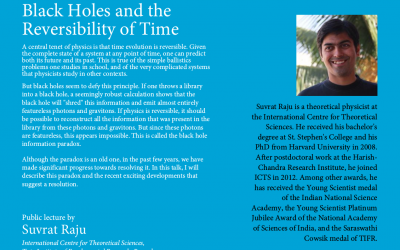A central tenet of physics is that time evolution is reversible. Given the complete state of a system at any point of time, one can predict both its future and its past. This is true of the simple ballistics problems one studies in school, and of the very complicated systems that physicists study in other contexts.
But black holes seem to defy this principle. If one throws a library into a black hole, a seemingly robust calculation shows that the black hole will "shred" this information and emit almost entirely featureless photons and gravitons. If physics is reversible, it should be possible to reconstruct all the information that was present in the library from these photons and gravitons. But since these photons are featureless, this appears impossible. This is called the black hole information paradox.
Although the paradox is an old one, in the past few years, we have made significant progress towards resolving it. In this talk, the speaker will describe this paradox and the recent exciting developments that suggest a resolution.


